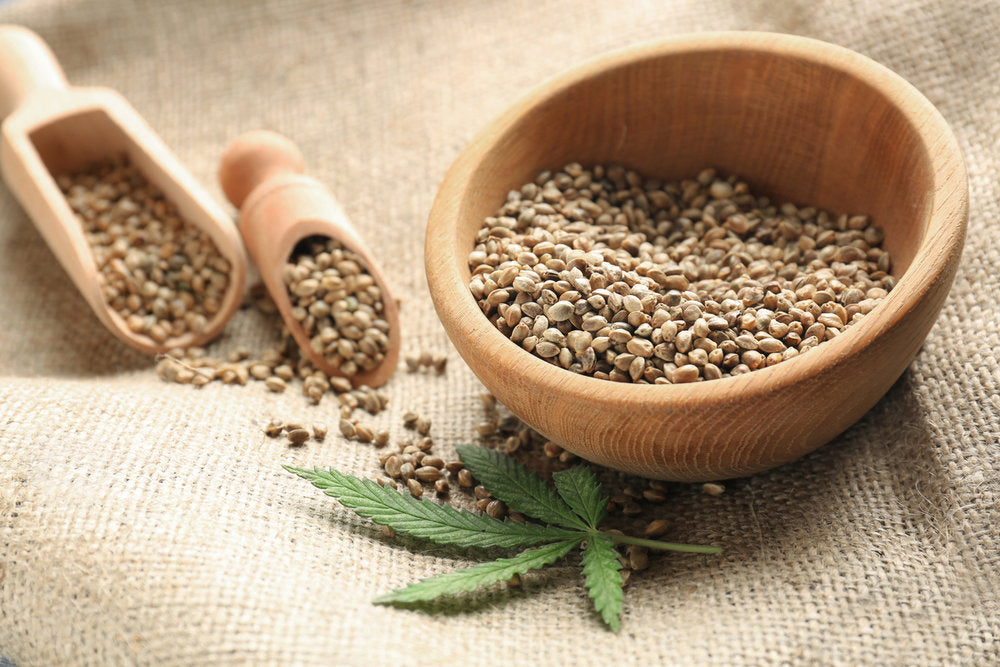
You’ve probably heard of CBD oil tincture, CBN, or a combination of both for sleep. But did you know research suggest that hemp seeds may also help you sleep soundly?
How Do They Work?
Hemp seeds have at least three constituents that contribute to a healthy sleep cycle.
1. Magnesium
Hemp is very high in magnesium, a mineral that calms the body and relaxes muscles. An ounce of hemp seeds provides nearly half the recommended daily intake — good news for Americans, many of whom are not getting their recommended amounts.
Magnesium promotes restorative sleep, and deficiency is linked to insomnia and poor-quality sleep, Sheri Vettel, a dietician and Integrative Nutrition health coach, told Well + Good.
2. Tryptophan
Your body can’t produce this amino acid, so must be sourced from the diet. And hemp seed happens to be high in it.
Tryptophan is a mild sedative, and research suggests that a diet rich in tryptophan can help stave off depression and promote sociability. It’s the precursor of the neurotransmitter serotonin, a hormone known to stabilize mood and promote a feeling of well-being.
Tryptophan also has positive effects on the gut microbiome, supporting overall health.
3. Vitamin B6
Together, tryptophan and vitamin B6 are precursors for melatonin, a hormone that regulates sleeping and waking, according to Well + Good.
“When eating hemp seeds, their vitamin B6 content will trigger the conversion of tryptophan into serotonin, which your body can then convert into melatonin,” Kylene Bogden, a wellness advisor and registered dietitian nutritionist with certifications in various specialties, told Well + Good. Bogden noted that this gently supports the body’s melatonin supply without the potential to overload your system with a supplement that could leave you groggy the next day.
How to Maximize the Benefits
While there don't appear to be many (if any) scientific studies on hemp seeds and sleep, professionals working with diet and nutrition recommend the following to their clients.
Amy Shapiro, a registered dietician cited by Women’s Health, suggested eating a serving a few hours before bed to get the most from hemp seeds’ sleep-promoting benefits. But she also recommended eating a tablespoon a day, no matter the time.
For Well + Good, dietician and health coach Sheri Vettel echoed the sentiment that a regular “dose” would be needed. Tryptophan is not the only amino acid in hemp seed, and other constituents may counteract it by promoting alertness.
“Therefore it’s important to ensure that your diet regularly contains several quality sources of tryptophan, including hemp seeds, and that tryptophan metabolism is supported in the body,” Vettel said. “Luckily, hemp seeds are also a good source of soluble fiber, a type of fiber which feeds beneficial bacteria in the gut.”
How Much Should I Eat?
At least one tablespoon daily, according to Shapiro. They’re a nutrient dense food, so you’d be hard pressed to overdo it.
Two tablespoons of hemp seed has 90 calories and six grams of fat, but that’s not scaring dietician Keri Glassman . Writing for Web MD she quipped, “Watching what you eat? I say, ‘Keep sprinkling!’ That two-tablespoon serving size offers two grams of fiber, five grams of protein, 300 mg of potassium, 15 percent of your vitamin-A requirement and 25 percent of your daily iron needs. It’s hard to find another food that nutrient-dense.”
The seeds have a mild flavor, but a serious crunch. You can garnish almost anything with hemp seeds:
- salads
- yogurt
- oatmeal
- a rice bowl
- pasta
Happy eating — and happy sleeping!






































